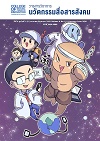รัฐกับศักยภาพของภาพยนตร์
Abstract
State and Potentials of Cinemaสังคมไทยมักจะมองภาพยนตร์เป็นเพียงงานที่สร้างขึ้นโดยมีเป้าหมายเพื่อความบันเทิง แต่ความจริงภาพยนตร์มีศักยภาพที่ทรงพลังกว่านั้นมาก ในฐานะเป็นศิลปะแขนงที่ 7 ภาพยนตร์ ถือเป็นผลผลิตทางวัฒนธรรม เป็นภาพสะท้อน ของวิถีชีวิต และทัศนคติของมนุษย์ สำหรับรัฐบาลในหลายประเทศเห็นว่าภาพยนตร์สามารถซุกซ่อนโลกทัศน์ หรืออุดมการณ์บางอย่างได้จึงถูกนำมาใช้เป็นเครื่องมือสำคัญในการรณรงค์ สร้างค่านิยม และอุดมการณ์ทางการเมือง ในขณะเดียวกันรัฐเองก็มีความเกรงกลัวศักยภาพนี้ถ้าตกไปอยู่ในอำนาจของคนที่เห็นต่าง ภาพยนตร์จึงเป็นงานศิลปะเพียงแขนงเดียวในปัจจุบันที่มีกฎหมายออกมาควบคุมจริงจัง ในประเทศไทยแม้ว่าพระราชบัญญัติฉบับใหม่จะมีการแบ่งเรตติ้งตามอายุผู้ชมแล้วก็ตาม การห้ามฉาย หรือสั่งตัดภาพยนตร์ ยังคงอยู่ คนไทยมีความเคยชินจากการไม่ถนัดในการใช้เสรีภาพในการแสดงความคิดเห็นต่อต้านผู้มีอำนาจ มิได้มีความเข้าใจในเรื่องสิทธิ และหน้าที่ในระบอบประชาธิปไตยอย่างแท้จริง ในยุคแห่งข้อมูลข่าวสารวิธีการควบคุมแบบเดิมๆเช่นนี้ อาจทำไม่ได้เต็มที่ ข่าวจริง ข่าวเท็จ บางครั้งแทบจะแยกแยะไม่ออก การติดอาวุธทางปัญญาให้กับประชาชนย่อมน่าจะเป็นวิธีการที่มีผลดีมากกว่าการปกปิดข้อมูล ถ้าผู้มีอำนาจมีวิสัยทัศน์ที่คับแคบ ขาดขันติธรรมในการปกครอง ย่อมเป็นการยากที่จะเกิดการพัฒนาให้เกิดเป็นสังคมประชาธิปไตยที่แท้จริงคำสำคัญ : สารคดี / โฆษณาชวนเชื่อ / การเซ็นเซอร์ / การรู้เท่าทันสื่อAbstract Thai society usually views cinema as a media created merely to entertain, however cinema has enormously more potentials than that. Being one of the art forms, cinema is product of culture, reflecting ways of life and expressing human’s view. Various states believe that cinema can implicitly represent some kind of ideals and viewpoints so they used it as a tool to create social values and to endorse political views. At the same time, they are afraid of the same kind of power if fall into the wrong’s hands, hence there are censorship laws for this kind of art form. In Thailand, we always have strict control of cinema shown in movie theatre. Banning certain films and removing some scenes are still applied although the rating system is introduces in the law since 2009. Most Thai people are not familiar with freedom of speech; they do not dare to express their opinion against authorities. They do not truly understand the importance of their rights and duties in democratic society. In this information age, this kind of control may no longer be effective. It is more difficult for people to differentiate truths and lies. To arm people with wisdom and knowledge by letting them practice using their own critical mind should be a better way than covering information. However, if that leader has a narrow vision; ruling without tolerance, it will be difficult to develop the country into a truly democratic society.Keyword: Documentary / Propaganda / Censorship / Media LiteracyDownloads
Download data is not yet available.
Downloads
Published
2018-01-01
Issue
Section
บทความวิจัย




